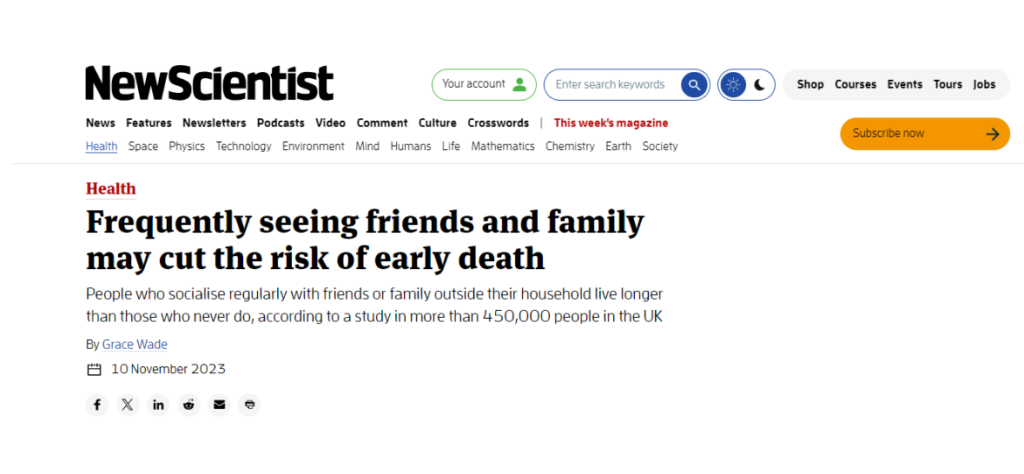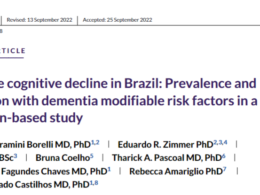the health strategist
institute for strategic health transformation
& digital technology
Joaquim Cardoso MSc.
Chief Research and Strategy Officer (CRSO),
Chief Editor and Senior Advisor
November 10, 2023
What is the message?
Regular socialization with friends and family outside one’s household is associated with a longer lifespan, according to a study involving over 450,000 people in the UK.
The research reveals that individuals who never receive visits from loved ones face an increased risk of early death, emphasizing the significant impact of specific social connections on health.

What are the key points?
Study Overview:
- The study, conducted by Hamish Foster and colleagues at the University of Glasgow, gathered data from over 450,000 individuals aged 38 to 73 in the UK.
- Participants underwent a one-time physical health assessment and completed a questionnaire assessing five types of social connections, including feelings of loneliness, confiding in someone close, visits from friends or family, and participation in weekly group activities.
- The researchers tracked the participants over several years to determine the impact of social connections on longevity.
Impact of Social Connections on Longevity:
- After adjusting for various factors, including age, sex, physical activity, socioeconomic status, and chronic health conditions, the study found that all five types of social connections influenced longevity.
- The frequency of visits from friends and family had the most significant impact, with those who never received such visits facing a 39% increased risk of death compared to those visited daily.
- Even individuals who did not live alone but never received visits had a 25% greater risk of death during the study period.
Relationship Quality and Frequency of Visits:
- The study suggests that the quality of relationships may play a role in the impact on longevity. Negative relationships, even with cohabitants, could contribute to health risks.
- The risk of death during the study period was found to be similar for those whose loved ones visited monthly, weekly, or daily, indicating that even monthly visits may have a positive impact on longevity.
DEEP DIVE

Frequently seeing friends and family may cut the risk of early death
People who socialise regularly with friends or family outside their household live longer than those who never do, according to a study in more than 450,000 people in the UK
NewScientist
By Grace Wade

Spending time with loved ones may reduce the risk of an early death, while never being visited by friends of family can raise the risk even for people who don’t live alone. The finding suggests that some social connections have a greater impact on health than others.
Previous research has linked social isolation to poorer health. Yet, little is known about how different social connections influence longevity.
So, Hamish Foster at the University of Glasgow, UK, and his colleagues collected data on socialisation and loneliness from more than 450,000 people between 38 and 73 years old living in the UK. About 55 per cent of them were women and almost 96 per cent were white.
Between 2006 and 2010, all the participants completed a one-time physical health assessment and questionnaire measuring five different types of social connection.
The questionnaire asked how often they felt lonely, could confide in someone close, had friends or family visit and participated in weekly group activities. It also asked if they lived alone. The researchers then tracked the participants to find out how many had died by 2021.
After adjusting for factors including age, sex, physical activity level, socioeconomic status and chronic health conditions, the researchers found that all five types of social connection impacted longevity. The frequency of visits from friends and family had the greatest influence.
On average, people whose friends or family never visited had a 39 per cent increased risk of dying during the study period compared with those whose loved ones visited daily.
Even those who didn’t live alone had a 25 per cent greater risk of death in this time if friends or family never visited. Participation in weekly group activities didn’t mitigate these effects, either.
The findings could be due to relationship quality. “Some relationships can be negative,” says Foster. “So, you could live with one other person, but the relationship quality is poor.” Regular visits from loved ones may be crucial in this scenario.
The team also found that the risk of dying during the period was about the same for those whose loved ones visited monthly, weekly or daily. “Just having monthly visits seems to be enough,” says Foster.
Originally published at https://www.newscientist.com












